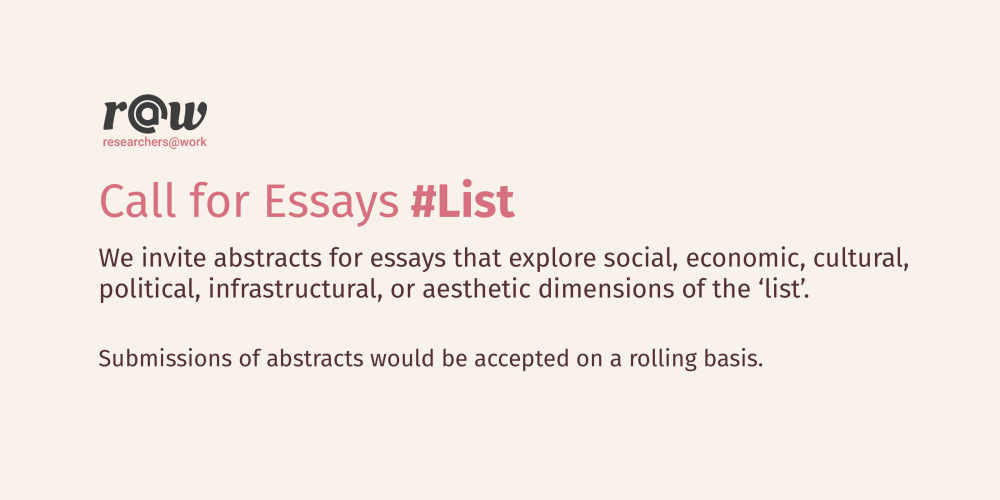Call for Essays — #List
The researchers@work programme at CIS invites abstracts for essays that explore social, economic, cultural, political, infrastructural, or aesthetic dimensions of the ‘list’. We have selected 4 abstracts among those received before August 31, 2019, and are now accepting and evaluating further submissions on a rolling basis.

For the last several years, #MeToo and #LoSHA have set the course for rousing debates within feminist praxis and contemporary global politics. It also foregrounded the ubiquitous presence of the list in its various forms, not only on the internet but across diverse aspects of media culture. Much debate has emerged about specificities and implications of the list as an information artefact, especially in the case of #LoSHA and NRC - its role in creation and curation of information, in building solidarities and communities of practice, its dependencies on networked media infrastructures, its deployment by hegemonic entities and in turn for countering dominant discourses.
From Mailing Lists to WhatsApp Broadcast Lists, lists have been the very basis of multi-casting capabilities of the early and the recent internets. The list - in terms of list of people receiving a message, list of machines connecting to a router or a tower, list of ‘friends’ and ‘followers’ ‘added’ to your social media persona - structures the open-ended multi-directional information flow possibilities of the internet. It simultaneously engenders networks of connected machines and bodies, topographies of media circulation, and social graphs of affective connections and consumptions.
As a media format that is easy to create, circulate, and access (as seen in the number of rescue and relief lists that flood the web during national disasters) or one that is essential in classification and cross-referencing (such as public records and memory institutions), the list becomes an essential trope to understand new media forms today, as the skeletal frame on which much digital content and design is structured and also consumed through.
- What new subjectivities - indicative of different asymmetries of power/knowledge - do list-making, and being listed, engender? How are they hegemonic or intersectional?
- What new modes of questioning and meaning-making have manifested today in various practices of list-making? What modalities of creation and circulation of lists affords their authority; what makes them legitimate information artefacts, or contentious forms of knowledge?
- How and when do lists became digital, where are lists on paper? How do we understand their ephemerality or robustness; are they medium or message?
- Are there cultural economies of lists, list-making, and getting listed? Who decides, and who gets invisibilized on lists?
Call for Essays
We invite abstracts for essays that explore social, economic, cultural, political, infrastructural, or aesthetic dimensions of the ‘list’.
Please submit the abstracts by Friday, August 23, 2019.
We will select 10 abstracts and announce them on Friday, August 30. The selected authors are expected to submit a full draft of the essay (of 2000-3000 words) by Monday, September 30. We will share editorial suggestions with the authors, and the final versions of the essays will be published on the researchers@work blog from November onwards. We will offer Rs. 5,000 as honorarium to all selected authors.
Please submit the abstract (300-500 words), and a short biographic note, in a single text file with the title of the essay and your name via email sent to [email protected], with the subject line of ‘List’.
Authors are very much welcome to work with text, images, sounds, videos, code, and other mediatic forms that the internet offers.

